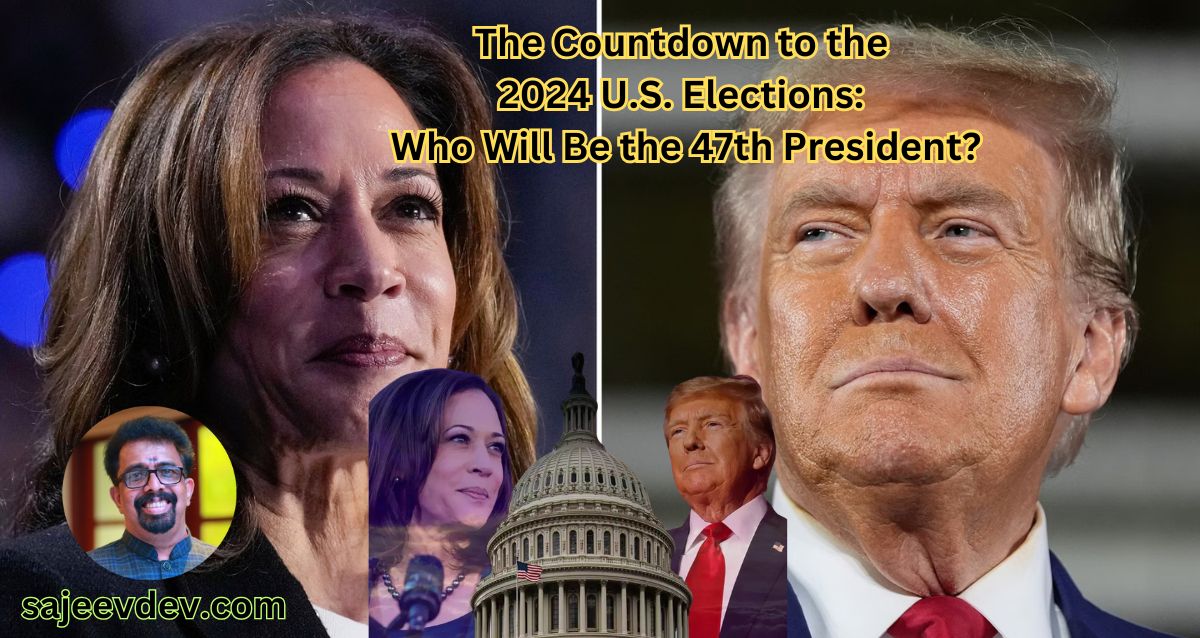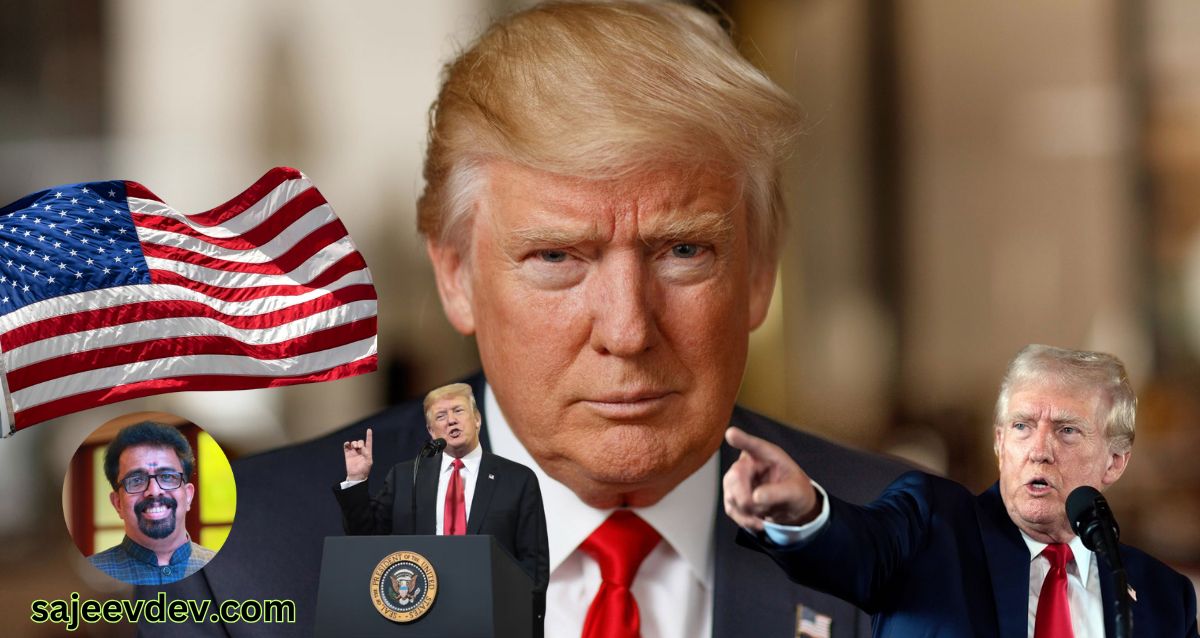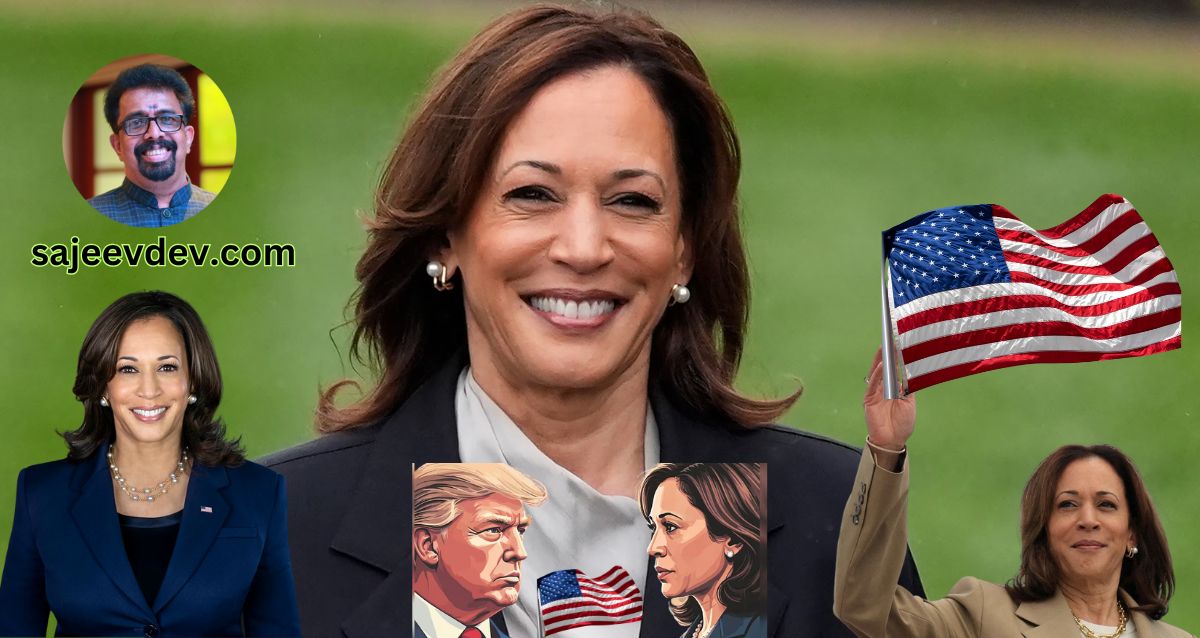Overview of the 2024 U.S. Elections
The 2024 U.S. elections represent a pivotal moment in the nation’s political history, as candidates vie for the presidency and various congressional seats. With the United States experiencing an array of complex societal issues, ranging from economic challenges to international relations, the significance of these elections cannot be overstated. Voter turnout is expected to influence not only the presidential race but also the composition of the Senate and House of Representatives, which will ultimately affect policymaking for years to come.
Historically, elections have served as a fundamental mechanism through which American citizens express their will, shaping the political landscape and directing the nation’s course. Each electoral cycle builds upon the last, reflecting shifts in public opinion and emerging demographics. The 2024 elections are anticipated to be particularly crucial, as they follow a period marked by a global pandemic, social justice movements, and heightened political division. The outcomes could redefine party platforms and realign voter bases, heralding a new chapter in American governance.
Moreover, the electoral process not only determines leadership but also influences the future trajectory of critical issues such as healthcare, education, and climate change. Given the automated nature of modern campaigning and the increasing role of social media in shaping public perception, candidates will need to adapt to and address the concerns of an evolving electorate. As Americans prepare to head to the polls, the stakes are higher than ever, and the implications of this election cycle extend beyond the immediate results. It is paramount for citizens to engage in the democratic process, as the decisions made in 2024 will resonate in the fabric of the nation for generations to come.
The Importance of Voting: 186 Million Americans Eligible
As the 2024 U.S. elections approach, the significance of voting cannot be overstated. With over 186 million eligible Americans prepared to cast their votes, the power of the electorate plays a crucial role in shaping the nation’s future. Voter participation is a fundamental aspect of democracy, as it allows citizens to voice their opinions and influence governmental policies that affect their lives. The impact of this vast pool of eligible voters can be seen in the outcomes of elections, where every vote matters.
Historically, higher voter turnout correlates with increased engagement in the political process, enhancing the representative nature of the government. Individuals who participate in elections often feel more empowered and are consequently more likely to be involved in civic activities beyond voting, such as community advocacy and local governance. This broad participation reflects the diversity of opinions and interests in the electorate, promoting a more balanced and representative decision-making process.
Despite the clear importance of voting, various factors can either encourage or hinder voter turnout. Accessibility to polling places, voter registration processes, and public awareness initiatives are essential in facilitating participation. For instance, various outreach programs emphasize the importance of understanding voting rights, addressing misconceptions, and providing necessary resources for potential voters. In contrast, barriers such as strict ID laws, misinformation, and socio-economic factors can discourage individuals from participating in the electoral process.
As the nation gears up for the elections, it is crucial to recognize that every eligible voter has the opportunity and responsibility to contribute to the democratic process. By understanding the significance of their vote and overcoming barriers to participation, Americans can ensure that their voices are heard, thereby shaping the future of the country as they head toward the selection of the 47th president.
Key Issues Driving the 2024 Election
As the 2024 U.S. elections approach, several critical issues are anticipated to drive the conversation and influence voter preferences. Chief among these are the economy, healthcare, climate change, and social justice. Each of these areas holds significant weight in the minds of the electorate and is likely to shape the policy platforms of the candidates vying for the presidency.
The economy remains a paramount concern for many Americans. Voters are often deeply affected by inflation rates, employment opportunities, and overall economic stability. As families navigate financial challenges, including rising costs of living, candidates will need to present compelling economic strategies that not only address immediate concerns but also propose long-term solutions. Discussions surrounding tax reforms and job creation will be pivotal in capturing the attention of economically aware constituents.
Healthcare is another critical issue that resonates with a broad demographic. As healthcare costs continue to soar and access remains a challenge, voters are looking for candidates who can articulate comprehensive healthcare reforms. The ongoing debate over public versus private healthcare systems is likely to be at the forefront of campaign discussions, prompting candidates to carefully consider their positions on issues such as universal healthcare and prescription drug pricing.
Climate change has emerged as a defining issue for a significant portion of the electorate, particularly among younger voters. Candidates will be expected to not only acknowledge the urgency of climate action but to also propose actionable plans that address environmental sustainability while balancing economic growth. The voters’ anticipation for comprehensive climate policies could heavily influence the selection of the 47th President.
Lastly, social justice issues are expected to play a crucial role in shaping voter sentiment. Issues such as racial equality, LGBTQ+ rights, and immigration reform remain at the forefront of public discourse. Candidates who convey a strong commitment to social justice initiatives are likely to garner support from voters advocating for greater equality and civil rights.
Candidates to Watch: The Race for the Nomination
The 2024 U.S. presidential election has already begun shaping up with several key candidates emerging from both major parties: Democrats and Republicans. As political landscapes shift, understanding this dynamic race for the nomination is essential to gauge potential outcomes. On the Democratic side, incumbent President Joe Biden is poised to seek re-election, although he faces challenges stemming from concerns about his age and health. Biden’s campaign strategy focuses on highlighting his administration’s achievements, including economic recovery post-pandemic and infrastructure investments. His popularity within the party remains significant, yet challenges from more progressive candidates like Senator Bernie Sanders may emerge, pushing the party’s platform further left.
Meanwhile, the Republican field is vibrant, with several potential nominees positioning themselves for a chance at the presidency. Former President Donald Trump remains a dominant figure, leveraging his established voter base and name recognition. His campaign emphasizes his previous administration’s successes and critiques of the current administration’s policies. However, Trump’s ongoing legal challenges could impact his campaign’s momentum. Other Republican candidates, such as Governor Ron DeSantis of Florida, have cultivated significant support by appealing to conservative voters on issues like education reform and immigration. DeSantis aims to present himself as a fresh alternative to Trump, while candidates like Nikki Haley, the former U.N. ambassador, are attempting to shine in a crowded field focused on electability.
The landscape of candidates is complex, with each vying for their respective party’s nomination. The strategies employed by these candidates will shape the narratives leading up to the primaries, ultimately influencing their chances of securing the presidency. As the election cycle progresses, staying attuned to these political maneuvers will be crucial to understanding who may emerge as the leading candidate to succeed in the 2024 election.
Election Timeline: Key Dates and Milestones
The 2024 U.S. elections are fast approaching, and a comprehensive understanding of the election timeline is essential for voters aiming to stay informed and engaged. Key dates and milestones will guide the electoral process, enabling citizens to participate actively in shaping the nation’s future. The primaries, conventions, and debates serve as crucial components in this timeline, ultimately leading to the selection of the nominee for each political party.
The primary elections, scheduled to commence in early 2024, will be critical in determining the candidates vying for the presidency. The Iowa caucus, traditionally the first major event in the nominating process, is set for early January, serving as a bellwether for the momentum of candidates. New Hampshire, Nevada, and South Carolina will follow suit with their primaries, culminating in Super Tuesday in March, when numerous states will hold their elections simultaneously, significantly impacting the overall race.
As the primaries conclude, the Democratic and Republican national conventions will take place in the summer of 2024. These conventions are pivotal milestones where each party officially nominates its candidate for president and outlines their platform for the upcoming election. The Democratic National Convention typically occurs in July, followed closely by the Republican National Convention, allowing both parties to showcase their respective candidates to the public.
Shortly after the conventions, the presidential debates will begin. Scheduled for the fall, these debates allow candidates to engage with one another on various issues, providing voters with insights into their policies and leadership styles. The culmination of this timeline will be the general election set for November 5, 2024, where Americans will cast their votes to determine who will ultimately become the 47th President of the United States. Understanding these key dates allows voters to plan and participate in this crucial democratic process.
The Role of Debates in Shaping Public Opinion
Presidential debates have long been a cornerstone of the electoral process in the United States, serving as pivotal events where candidates present their policies and engage directly with their opponents. Historically, these debates play a critical role in shaping public opinion and influencing voter behavior. They provide voters with a unique opportunity to assess candidates’ positions on key issues, their demeanor, and their ability to communicate effectively under pressure. This format can make or break a candidate’s momentum as elections approach.
In previous elections, there have been notable instances where a debate has significantly altered the trajectory of a campaign. For example, in 1984, President Ronald Reagan’s performance in his second debate against Walter Mondale helped to strengthen his lead and ultimately secure his re-election. Similarly, the 2000 election, where debates highlighted the stark contrast between George W. Bush and Al Gore, influenced perceptions and decisions leading up to the elections. These events not only engage the electorate but also can set the narrative for the remainder of the campaign.
As we look toward the upcoming 2024 U.S. elections, the debates are expected to remain a focal point of voter engagement. In an era where information dissemination is rapid and social media plays a significant role in shaping opinions, candidates will likely strategize intensely to ensure their messages resonate. Voter expectations for authenticity and clarity will be high, making it crucial for candidates to convey their policies effectively. In the backdrop of varied social issues and a divided electorate, the 2024 debates could potentially influence voter turnout and decision-making in significant ways, reinforcing the importance of debates as a tool for democratic engagement.
Voter Registration and Accessibility
Voter registration is a fundamental aspect of the democratic process, ensuring that citizens can participate in elections that shape their governance. In the United States, the process of voter registration varies by state, with some states allowing same-day registration, while others have more rigid deadlines. Generally, eligible voters can register online, by mail, or in-person at designated locations. As the 2024 U.S. elections approach, it is crucial for all eligible citizens to be aware of these options and to register in a timely manner.
Accessibility remains a significant concern in the voter registration process, particularly for marginalized communities. Efforts to enhance voter accessibility include initiatives aimed at providing resources in multiple languages and accommodating individuals with disabilities. Organizations such as the National Association of Secretaries of State (NASS) and the U.S. Election Assistance Commission have been at the forefront of these efforts, promoting outreach in underserved communities to ensure that all voices are heard in the electoral process.
Despite these positive developments, challenges persist. Many individuals face barriers that can prevent them from completing their voter registration. These obstacles may include complex registration processes, lack of access to technology, and misinformation regarding voter eligibility requirements. Moreover, efforts to implement voter ID laws have raised concerns about disenfranchisement, as such laws disproportionately affect low-income and minority voters.
To address these challenges, community organizations and advocacy groups have been tirelessly working to raise awareness about voter registration and accessibility. By providing information on how to register and the importance of voting, they are helping to empower individuals to exercise their rights. As the 2024 U.S. elections draw closer, it is imperative to foster an inclusive environment that enables all eligible Americans to participate in shaping their future through the electoral process.
The Impact of Social Media on Elections
Social media has transformed the political landscape, increasingly becoming a pivotal tool in election campaigns. As the countdown to the 2024 U.S. Elections begins, understanding the influence of these platforms on the democratic process is essential. Candidates are leveraging social media to reach a broader audience, sharing their messages and policies in real-time while engaging with potential voters more directly than traditional media channels allow. This trend highlights the continued evolution of campaign strategies to cater to an audience that demands immediacy and authenticity.
The advantages of utilizing social media for campaigning are evident. Candidates can craft tailored messages aimed at specific demographics, refining their outreach efforts. Platforms like Twitter, Facebook, and Instagram enable candidates to connect with voters on a personal level, showcasing their personality and stances on key issues. Additionally, social media facilitates grassroots movements and helps mobilize supporters through organized online events, encouraging civic engagement and turnout. This direct line of communication not only fosters transparency but also allows candidates to respond quickly to emerging news, concerns, or controversies.
However, the pervasive nature of social media also introduces significant challenges, particularly concerning misinformation. The spread of false narratives can undermine the electoral process by misleading voters and skewing public perception. In 2024, candidates will need to navigate this complex landscape, balancing their approach to engagement while addressing potential pitfalls associated with the unregulated exchange of information. Consequently, the responsibility falls on both candidates and platforms to promote accurate and trustworthy content, ensuring that voters can make informed decisions. The integration of social media will undoubtedly continue to shape the election dynamics, making it a critical component of modern political strategies.
What to Expect on Election Day
As the 2024 U.S. elections approach, it is vital for voters to be well-prepared for Election Day to ensure a smooth voting experience. Polling hours can vary by state, so it is important for voters to check their local polling place hours in advance. Most locations open between 6:00 AM and 8:00 AM and close between 7:00 PM and 9:00 PM, but verifying specifics from local election authorities is advisable to avoid any confusion.
On Election Day, voters should bring a valid form of identification, which may differ by state. Some states require photo ID, while others accept non-photo identification or alternative documents. It is essential for voters to familiarize themselves with their state’s identification requirements ahead of time, as failure to provide the necessary documentation might hinder one’s ability to cast a vote.
Voters should also ensure that they are registered to vote and have verified their voting location. Online tools and services provided by the National Association of Secretaries of State can assist individuals in checking their registration status. Understanding the layout of the polling place, including any potential obstacles such as long lines, can also facilitate a seamless voting experience.
Moreover, early voting and absentee ballots become critical methods for those unable to vote on Election Day. Many states now offer early voting options that allow individuals to cast their votes during designated periods preceding the election. This flexibility not only helps alleviate congestion on Election Day but also encourages higher voter turnout. For those who opt for absentee ballots, it is crucial to understand the deadlines for requesting and submitting these ballots to ensure that each vote counts.
Being prepared on Election Day is an essential part of the democratic process. Voters who are informed about polling hours, required identification, and early voting options will contribute to an efficient and effective electoral outcome.



